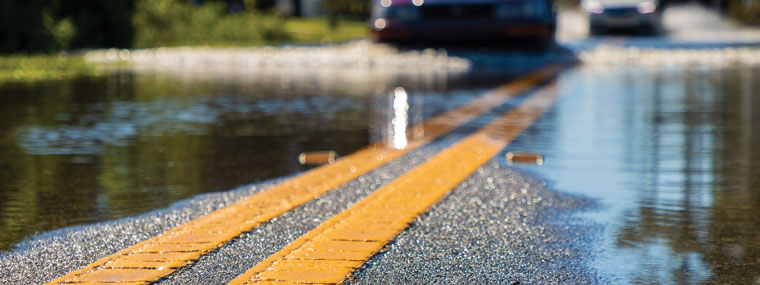
Hurricane Preparedness for Condominiums and HOAs in South Florida
By Evan Bradley, CFO / Published June 2023

South Florida is known for its beautiful beaches, sunny weather, and, unfortunately, its frequent hurricanes. Condominiums and homeowners’ associations (HOAs) must take proactive steps to prepare for these natural disasters to ensure the safety of their residents and properties. Here are some tips and strategies for hurricane preparedness in South Florida.
1. Create a Hurricane Preparedness Plan
The first step to hurricane preparedness is to create a comprehensive plan that outlines procedures and protocols for all aspects of hurricane readiness. This plan should include the following:
- Emergency contact information for residents, staff, and emergency services
- Evacuation procedures and routes
- Procedures for securing the building and common areas, such as removing outdoor furniture and shutting off gas lines
- Communication plans for keeping residents informed before, during, and after the storm
- Protocols for dealing with flooding, power outages, and other potential hazards
2. Conduct Regular Inspections and Maintenance
Condominiums and HOAs should conduct regular inspections and maintenance to ensure that their buildings and common areas are hurricane ready. This includes the following:
- Checking for loose or damaged roof tiles, which can be dislodged by high winds
- Clearing gutters and drains of debris to prevent flooding
- Trimming trees and shrubs to remove dead branches or overgrowth that can become projectiles in high winds
- Securing all loose objects, such as patio furniture, grills, and trash cans, which can cause damage during a storm
- Testing backup generators and ensuring they are in good working order
3. Stock Up on Supplies
In the event of a hurricane, residents may be stranded in their units for several days without access to electricity or running water. Condominiums and HOAs should encourage their residents to stock up on emergency supplies, including the following:
- Nonperishable food and water sufficient for several days
- First aid kits, flashlights, and batteries
- Portable radios to stay informed of the latest updates
- Tarps, plastic sheeting, and duct tape to cover broken windows and holes in the roof
- Sandbags to prevent flooding
4. Communicate with Residents
Communication is critical during a hurricane. Condominiums and HOAs should keep their residents informed of the latest updates and procedures through a variety of channels, including the following:
- Email newsletters and alerts
- Text message alerts
- In-person meetings and notices posted in common areas
Residents should also be encouraged to sign up for emergency alerts from local authorities to receive the latest news and instructions.
5. Prepare for Power Outages
Power outages are a common occurrence during hurricanes and can last for days or even weeks. Condominiums and HOAs should have backup generators in place to power critical systems, such as elevators and emergency lighting. Residents should also be encouraged to prepare for power outages by preparing the following:
- Charging all electronic devices in advance
- Stocking up on batteries and portable chargers
- Having a plan for keeping medications refrigerated
- Using candles and lanterns safely and keeping them away from flammable materials
- Cleaning out their refrigerators
6. Review Insurance Coverage
Condominiums and HOAs should review their insurance policies to ensure they have adequate coverage for hurricane damage. This includes both property insurance to cover damage to the building and common areas as well as liability insurance to protect against claims from residents and visitors.
7. Have a Plan for Debris Removal
After a hurricane, there is often significant debris that must be removed from the property. Condominiums and HOAs should have a plan in place for debris removal, including the following:
- Coordinate with local authorities to ensure proper disposal
- Hire contractors or waste management companies in advance to ensure that they are available immediately after the storm
- Ensure that residents are aware of the debris removal plan and what their responsibilities are, such as separating trash and yard waste
8. Prepare for Flooding
Flooding is a common hazard during hurricanes, and condominiums and HOAs should take steps to prepare for it, including the following:
- Install flood barriers, such as sandbags or flood panels
- Raise electrical equipment and appliances off the ground
- Secure any loose outdoor equipment or furniture that could be swept away by floodwaters
- Create a plan for dealing with flood damage, including cleanup and repairs
9. Review Local Evacuation Routes and Shelters
In the event of a mandatory evacuation, condominiums and HOAs should be prepared to assist their residents with the following:
- Review local evacuation routes and shelters
- Coordinate transportation for residents who are unable to evacuate on their own
- Provide information and resources to residents about what they should bring with them if they evacuate
10. Conduct Regular Training and Drills
Finally, it is essential to conduct regular training to ensure that all staff are familiar with the hurricane preparedness plan and know what to do in the event of a storm. This can include the following:
- Understand how long it takes to fully implement the plan
- Provide training sessions on how to safely operate backup generators and other emergency equipment
- Review the plan and make updates as needed based on lessons learned from previous storms
Conclusion
Hurricane preparedness is critical for condominiums and HOAs in South Florida, where the risk of storms is high. By creating a comprehensive plan, conducting regular inspections and maintenance, stockpiling emergency supplies, communicating effectively with residents, and preparing for power outages, flooding, and debris removal, these communities can minimize damage and ensure the safety of their residents during a storm. Regular training will ensure that everyone is prepared and ready to act when a hurricane strikes.
Evan Bradley
CFO, Campbell Property Management
Evan joined Campbell in 2007 and has been responsible for the financial and information technology aspects of Campbell Property Management. As a licensed CAM and a graduate from Georgia Tech with a degree in business management, Evan has implemented an online accounts payable portal for associations, GPS-enabled violations software, online tenant and purchaser screening, and online architectural request submissions, and he is continually improving the corporate systems to increase efficiencies for association clients and employees.
In addition to his financial responsibilities, Evan works personally with some of Campbell’s largest clients to help improve efficiency and help the boards accomplish their goals by bringing expertise and education in budgeting, long-term fiscal planning, the document amendment process, rules and regulations, traffic enforcement, and other high-value areas.
For more information on Campbell Property Management, call 954-427-8770 or visit www.CampbellMGT.com.




